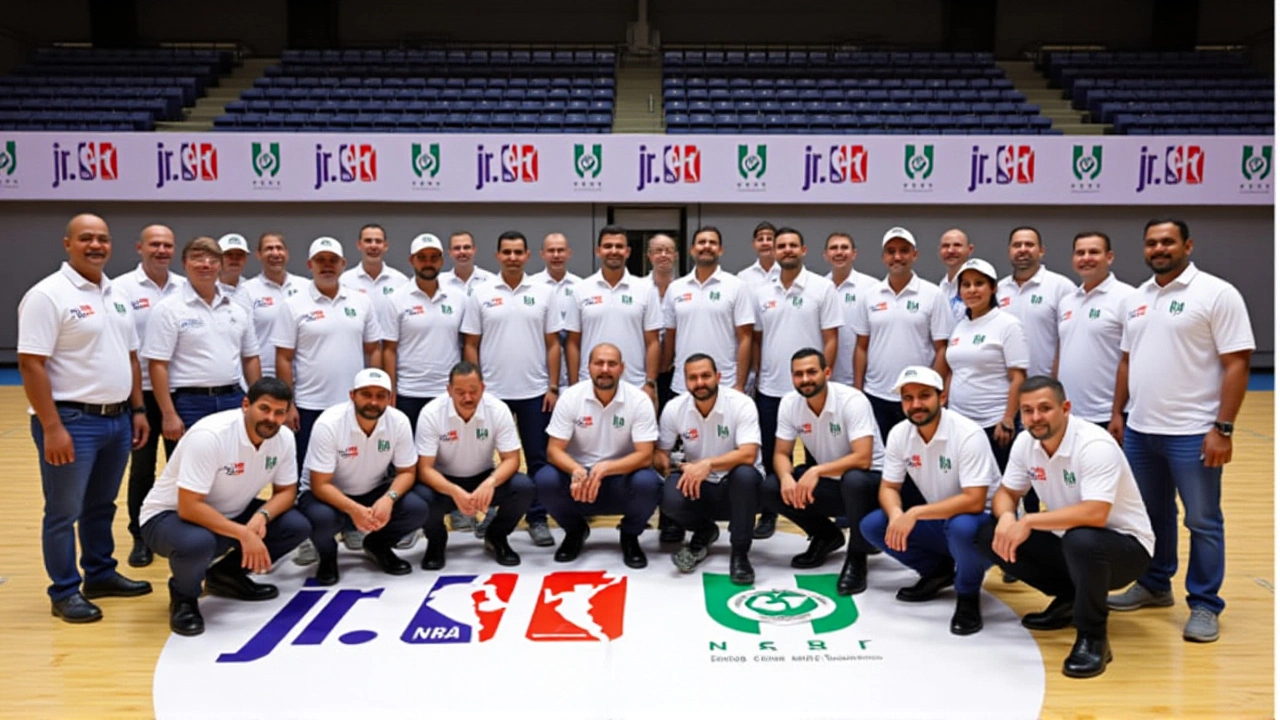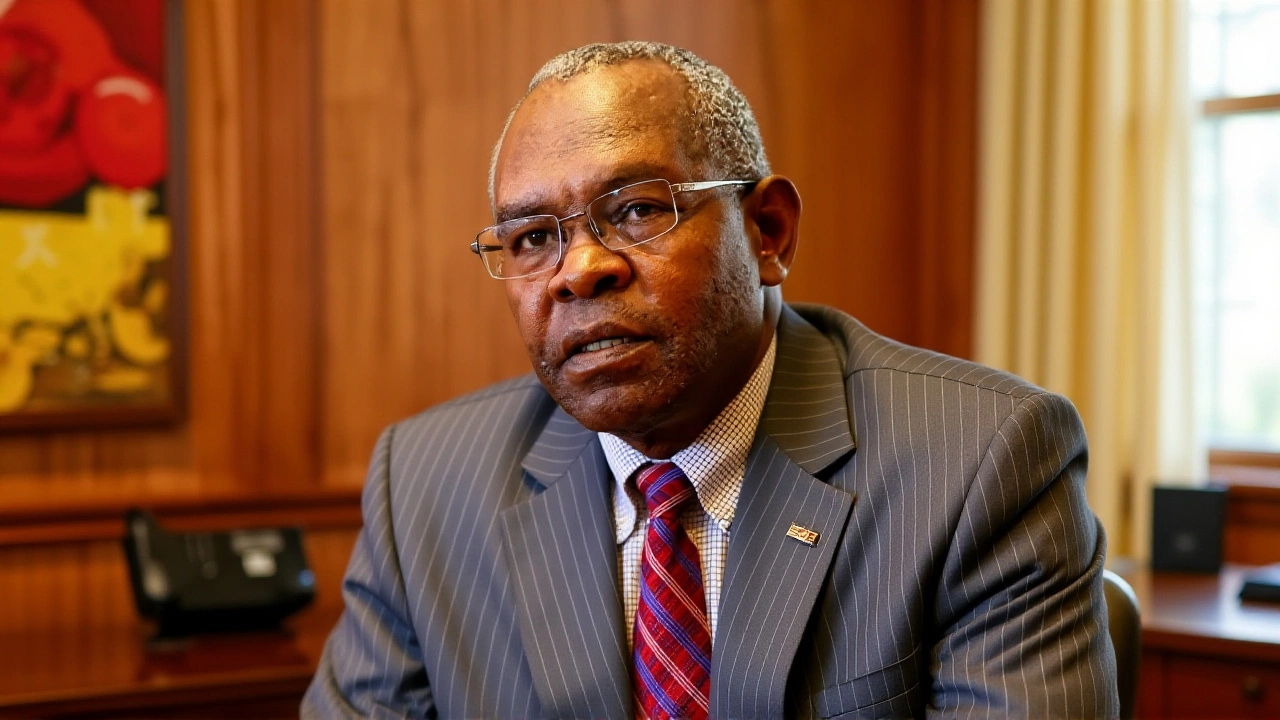NBA Africa & NSSF Train 120 Lagos Teachers to Boost School Basketball
 Oct, 7 2025
Oct, 7 2025
When Olabisi Joseph, president of Nigeria School Sport Federation, teamed up with NBA Africa for the Jr. NBA Coaches AcademyIndoor Hall, National Stadium, Surulere, Lagos, a new chapter in Nigerian school sports began. On Friday, September 26, 2025, exactly 120 educators gathered under one roof to learn how to bring high‑quality basketball instruction into classrooms and playgrounds across the country.
Why This Matters: Historical Context
Basketball has long been a fringe sport in Nigeria’s school system, eclipsed by football and athletics. The Ministry of Basic and Secondary Education has repeatedly highlighted the lack of trained coaches as a bottleneck for talent development. In 2018, a pilot program in Kano resulted in a modest 12% increase in student participation, but without a coordinated national push, progress stalled. The basketball development agenda finally gained traction when the NBA’s continental arm, NBA Africa, committed resources to grassroots coaching, echoing similar moves in Kenya and Ghana.
Training Program Details
The Jr. NBA Coaches Academy, a three‑day intensive, was designed around three pillars: technical skill, pedagogical methods, and program sustainability. Participants were divided into three groups:
- 70 primary‑school teachers
- 30 secondary‑school teachers
- 20 school sports officials
Representatives came from the Ministry of Basic and Secondary Education, the Universal Basic Education Board, and various state education departments. Each session blended on‑court drills with classroom‑style workshops. Coaches demonstrated age‑appropriate ball‑handling drills, teaching strategies for inclusive play, and ways to integrate basketball concepts into existing physical‑education curricula.
“We wanted teachers to feel confident stepping onto the court, not just as supervisors but as true coaches,” explained Samuel Okafor, a senior NBA Africa training coordinator, during a break‑out session. Okafor, who has overseen similar programs in South Africa, emphasized the importance of “coach‑the‑coach” models that can ripple through schools for years.
Reactions from Officials
When the final ceremony concluded, Olabisi Joseph took the microphone. “This event signifies a major step forward in promoting basketball development in Nigerian schools,” he said. “By equipping our teachers with the necessary skills and knowledge, we expect a profound impact on the growth of basketball from the grassroots level.” He added a heartfelt thank‑you to NBA Africa, noting that the partnership “will unlock the potential of our young athletes and foster a love for the game that will last a lifetime.”
Ministry spokesperson Dr. Aisha Bello echoed the sentiment, stating that the training aligns with the government’s 2024‑2029 Education Reform Plan, which earmarks N150 million for sports infrastructure upgrades. “Today’s teachers are tomorrow’s talent scouts,” she said, highlighting the dual role educators will play in physical development and talent identification.

Expected Impact on Schools
After certification, each teacher is expected to integrate a minimum of two basketball sessions per week into their physical‑education timetable. They will also organize quarterly basketball assemblies, a concept borrowed from U.S. school districts where “assembly‑style” games boost student excitement and participation. The plan includes a monitoring framework: schools will submit monthly activity logs to the NSSF, which will collate data for a national dashboard.
Early pilots suggest that such structured exposure can raise participation rates by 25‑30% within the first year. Moreover, the emphasis on inclusive drills means girls and students with disabilities will have tailored entry points, addressing gender gaps that have persisted for decades.
Future Plans and Expansion
NBA Africa has pledged to replicate the Lagos model in four additional states—Kano, Enugu, Rivers, and Oyo—by the end of 2026. Funding for these roll‑outs will come from a combined N200 million grant from the NBA’s Global Basketball Development Fund and matched contributions from state education ministries.
Meanwhile, the NSSF is drafting a “School Basketball Curriculum” that will standardize lesson plans, assessment rubrics, and safety protocols. The curriculum aims for official adoption by the Ministry of Basic and Secondary Education in early 2027, paving the way for a unified national approach.
Frequently Asked Questions
How will this training affect primary‑school students?
Primary‑school students will receive at least two basketball sessions each week, taught by teachers who now hold a certified coaching badge. This consistent exposure is expected to improve basic ball‑handling skills, increase overall physical activity, and give children an early taste of organized sport, which research shows boosts confidence and teamwork.
What role does NBA Africa play in the program?
NBA Africa provided the curriculum, expert coaches, and equipment for the Jr. NBA Coaches Academy. It also contributed funding and will oversee the rollout of similar training sessions in four other states, ensuring consistency in teaching methods and assessment standards.
Which organizations are responsible for monitoring the program’s success?
The Nigeria School Sport Federation will collect monthly activity reports from each participating school. These reports feed into a national dashboard managed jointly by the NSSF and the Ministry of Basic and Secondary Education, allowing officials to track participation rates, gender balance, and skill progression.
Will girls have equal access to the new basketball programs?
Yes. Training modules specifically address gender‑inclusive coaching techniques. Schools are required to run mixed‑gender sessions and to schedule separate girls‑only drills where cultural considerations call for it, aiming to close the participation gap that currently sits at roughly 40% female involvement.
What is the timeline for rolling out the curriculum nationwide?
A draft curriculum will be circulated for feedback by March 2026, with final approval expected by July 2026. Full implementation across all public primary and secondary schools is targeted for the 2027‑2028 academic year.

Ellen Ross
October 7, 2025 AT 22:02When you gaze upon the grand tapestry of sport, you must ask whether the NBA's foray into Lagos is truly a benificent gift or a subtle imperialist brushstroke upon the canvas of African education-after all, every corporate patronage carries the faint scent of market expansion, and we cannot ignore the whisper of profit behind those shiny basketballs.
Fabian Rademacher
October 8, 2025 AT 11:55Don't be fooled, the whole thing is just a PR stunt to plant NBA logos in Nigerian schools so they can harvest future talent and sell merch; it's classic soft power, and anyone who buys into the hype is blind to the agenda.
Terrell Mack
October 9, 2025 AT 01:49Yo, this is huge for the kids-finally some legit hoops coaching in classrooms, and I bet those teachers will turn their comps into real pipelines for talent, plus the drills are gonna be fire for building teamwork.
Dawn Waller
October 9, 2025 AT 12:55Oh, brilliant! Another elite sport seeping into our curricula-because what we really needed was more basketball, not more math…!!!! (srsly, who cares?)
Grace Melville
October 9, 2025 AT 21:15Great initiative! 😊
Ashlynn Barbery
October 10, 2025 AT 05:35It is commendable that the Nigeria School Sport Federation, in partnership with NBA Africa, has taken concrete steps toward embedding structured basketball instruction within the educational framework, thereby fostering both physical development and potential athletic pathways for young learners.
Sarah Graham
October 10, 2025 AT 11:09I'm really happy to see teachers being empowered with proper coaching tools-this kind of support can make a lasting, inclusive impact on our schools' sports culture.
Jauregui Genoveva
October 10, 2025 AT 16:42Seriously? While we chase hoops, let’s not forget the bigger issues like nutrition and education quality-prioritizing a foreign league over basic school needs feels off. 🙄
Quinten Squires
October 11, 2025 AT 03:49The Jr. NBA Coaches Academy is a three day intensive that covers technical skill pedagogy and program sustainability the curriculum was designed by experienced coaches from the NBA Africa division the teachers learned age appropriate ball handling drills and how to integrate basketball concepts into existing PE lessons the program aims to increase participation rates by at least twenty five percent within a year the NSSF will monitor activity reports through a national dashboard the inclusion of girls and students with disabilities is a forward looking step the funding from the Global Basketball Development Fund adds credibility to the project the rollout to four additional states will test scalability the success metrics will include enrollment numbers skill progression and gender balance the partnership with NBA Africa provides equipment and expertise that would be hard to source locally the Ministry of Basic and Secondary Education sees this as aligning with its 2024‑2029 reform plan the teachers’ certification may become a model for other sports the data collected could inform policy decisions the long term effects could reshape talent pipelines in Nigeria and possibly feed into professional leagues the initiative also serves as a soft diplomatic bridge between the US and Nigeria fostering cultural exchange the community response appears positive based on initial feedback and the structured approach may serve as a template for other African nations looking to develop grassroots basketball
Tyler Manning
October 11, 2025 AT 12:09While the data presented is thorough, let us remember that the true strength of this endeavor lies in its ability to showcase Nigerian excellence on the global stage, reinforcing our nation's athletic pride and affirming the strategic importance of nurturing homegrown talent.
james patel
October 11, 2025 AT 20:29The implementation framework leverages a modular curriculum delivery model aligned with the national sport development continuum, ensuring key performance indicators such as participation ratios, skill acquisition indices, and gender equity metrics are systematically tracked via an integrated data analytics platform.